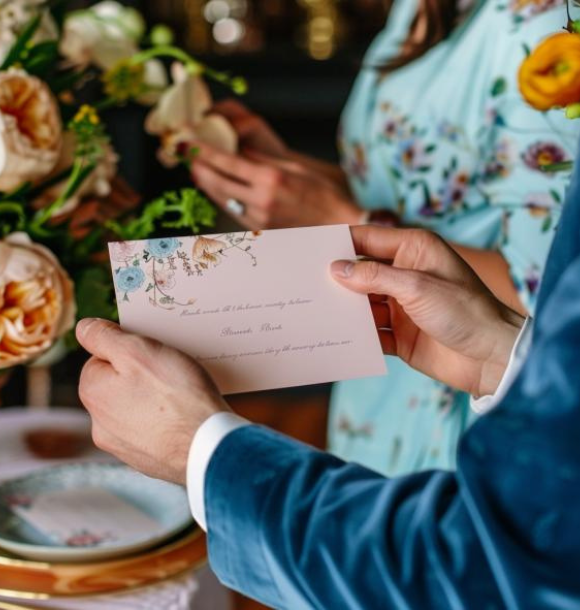The Right Way to RSVP: Committing and Sticking to It
RSVP, or “Répondez s’il vous plaît,” is a French phrase that translates to “Please respond.” It is an essential part of event planning, indicating whether or not the invited guest will be attending the event. Understanding and adhering to RSVP requests is not only important but also demonstrates proper etiquette and consideration for the host and other guests. RSVP plays a crucial role in event planning and logistics, ensuring that appropriate arrangements can be made for guests and that the event runs smoothly. In this article, we will explore the significance of RSVP, provide RSVP etiquette guidelines, highlight common mistakes to avoid, and offer tips for sticking to your RSVP commitments. By honoring your RSVP, you contribute to a more organized and enjoyable event experience for everyone involved.

Key Takeaways
- Understanding RSVP: RSVP stands for “Répondez s’il vous plaît”, which means “Please respond” in French. It is important to understand the meaning and purpose of RSVP in order to properly commit to an event.
- Why Is RSVP Important? RSVP is important for multiple reasons, including showing respect for the host and helping with event planning and logistics. It allows the host to make necessary arrangements and ensures a smooth execution of the event.
- RSVP Etiquette: When responding to an RSVP, it is important to be prompt and clear in your response. RSVP for all invited guests and avoid making last-minute changes or bringing uninvited guests. Following RSVP etiquette is key to maintaining good manners and ensuring a successful event.
- Common RSVP Mistakes to Avoid: Some common mistakes to avoid include ignoring or forgetting to respond, changing your RSVP at the last minute, and bringing uninvited guests. It is important to prioritize the event, set reminders, and avoid overcommitting to multiple events.
- Importance of Honoring Your RSVP: Honoring your RSVP shows respect for the host and other guests. It helps in the smooth execution of the event and ensures that all preparations and arrangements are made accordingly.
Understanding RSVP
RSVP, or “Répondez s’il vous plaît,” is a French phrase meaning “Respond if you please.” Understanding RSVP is crucial when receiving event invitations. Here are important points to consider:
1. Respond promptly: It is essential to reply to an RSVP invitation as soon as possible. This allows the host to make necessary arrangements, such as securing a venue, catering, and seating.
2. Communicate clearly: When replying to an RSVP, provide a definite response indicating whether you will attend or not. Avoid vague answers that may confuse the host.
3. Respect the deadline: Most invitations have a set deadline for RSVP responses. Make sure to reply within the given timeframe to help the host plan accordingly.
4. Honor your commitment: If you accept an invitation, make sure to attend the event. Cancelling last minute can cause disruption and inconvenience for the host.
5. Practice proper etiquette: Use polite language when responding to an RSVP. A simple “Yes, I will attend” or “No, I am unable to make it” is adequate.
6. Accommodate for a plus one: If the invitation allows for a guest, inform the host in advance if you plan to bring someone along.
Remember that RSVP is a formal request for a response. By understanding RSVP etiquette and promptly replying to invitations, you contribute to the smooth planning and organization of events.
Why Is RSVP Important?

RSVP – It’s not just a fancy acronym. Ever wondered why it carries such importance? In this section, we’ll unravel the significance of RSVP in social events. From showing respect for the host to managing the intricate planning and logistics, we’ll explore why this seemingly mundane act holds so much weight. So buckle up and get ready to dive into the world of RSVP etiquette!
Respect for the Host
Respect for the Host is important when RSVPing for an event. It shows consideration and appreciation for the host’s efforts in planning and organizing the gathering. Here are some important points to keep in mind:
1. Respond Promptly: RSVP as soon as possible after receiving the invitation. This allows the host to make necessary arrangements and plan accordingly.
2. Be Clear and Concise: When responding, be clear and concise about your attendance. If you cannot attend, politely decline with a brief explanation, if necessary.
3. RSVP for All Invited Guests: If the invitation allows for additional guests, RSVP for everyone accompanying you.
Ignoring or forgetting to respond to an invitation is disrespectful to the host and can cause inconvenience. Avoid changing your RSVP at the last minute unless absolutely necessary, and communicate any changes promptly. Bringing uninvited guests is a breach of etiquette. Always follow the invitation’s instructions regarding the number of guests allowed.
By respecting the host’s efforts and maintaining your RSVP, you contribute to a smoother execution of the event and show appreciation for the host’s hospitality.
Planning and Logistics
When it comes to RSVPs, planning and logistics are crucial for a successful event. Consider the following:
- Event size: Determine the number of guests expected to make arrangements for the venue, seating, and catering.
- Timeline: Set a deadline for RSVPs to allow for preparations and adjustments.
- Communication: Include clear instructions on how to RSVP.
- Guest accommodations: Consider any special needs.
- Seating arrangements: Plan based on confirmed attendees and preferences indicated in RSVPs.
- Catering and menu selection: Determine the quantity and variety of food and beverages needed.
- Event flow: Incorporate RSVPs into the event schedule.
- Ordering supplies: Estimate the quantity of necessary supplies.
- Transportation and parking: Make arrangements based on the number of attendees.
- Confirmation and follow-up: Send messages to provide additional details and ensure attendance.
Considering these factors will help you effectively organize and manage your event, ensuring a smooth and enjoyable experience for all guests.
RSVP Etiquette
When it comes to RSVP etiquette, there are a few key principles to keep in mind. From responding promptly to being clear and concise in your RSVP, these guidelines ensure a smooth and organized event. It’s important to remember to RSVP for all invited guests, avoiding any confusion or oversights. So, let’s dive into the world of RSVP etiquette and discover how to navigate it with grace and consideration.
Respond Promptly
When receiving an invitation, it is crucial to respond promptly. This demonstrates respect for the host and aids in event planning and logistics. Responding as soon as possible after receiving the invitation, preferably within a few days, is recommended. This enables the host to make any necessary arrangements and guarantee a seamless execution. Prompt responses also assist the host in finalizing important details such as catering and seating arrangements. Responding promptly showcases your gratitude for the invitation and helps build positive relationships with both the host and other guests. To ensure prompt responses, it is advisable to set reminders and refrain from overcommitting yourself. Ultimately, responding promptly is essential for conveying respect to the host and ensuring a successful event for all involved.
Be Clear and Concise
When replying to an RSVP invitation, it is important to be clear and concise. Please respond directly to the specified RSVP method, such as via email, phone call, or online platform.
Provide your name, indicate the number of guests attending, and make any necessary mention of dietary requirements or special requests.
Use polite and straightforward language, without unnecessary explanations.
It is advisable to respond as soon as possible, ideally within a few days.
Kindly confirm your attendance or state if you are unsure, specifying a date by which you will inform the host.
If needed, politely ask for clarification using clear and unambiguous language.
Keep your response brief and focused on the essential details, refraining from elaborating or including unrelated information.
By being clear and concise in your RSVP, you assist the host in effectively managing the event, ensuring a smooth and enjoyable experience for all involved.
RSVP for All Invited Guests
When responding to an event invitation, make sure to RSVP for all invited guests to ensure proper planning and consideration for the host. Here are the steps to follow:
1. Check the invitation: Carefully read the invitation to determine if it specifies the number of guests.
2. Consult with others: If you are unsure about the availability of other invited guests, communicate with them before responding.
3. Respond promptly: Send your RSVP as soon as possible to allow the host to make necessary arrangements.
4. Be clear and concise: Clearly state whether you and all of your invited guests will attend or not.
5. Provide necessary details: If the invitation requests additional information such as dietary restrictions or special accommodations, include those details in your response.
6. Respect the host’s wishes: If the invitation states that no additional guests are allowed, do not bring uninvited guests.
By following these guidelines, you ensure a proper response for all invited guests and demonstrate respect for the host’s planning efforts. Accurately communicating the attendance of all invited guests is crucial to avoid confusion or inconvenience.
Common RSVP Mistakes to Avoid

Attending events? Don’t make these common RSVP mistakes! From forgetting to respond, changing your RSVP last minute, to bringing uninvited guests, this section will guide you through the do’s and don’ts of properly committing to an event. Learn how to prioritize events, set reminders, and avoid overcommitting. Say goodbye to those awkward situations and be the reliable guest everyone wants to have. Let’s dive in!
Ignoring or Forgetting to Respond
Ignoring or forgetting to respond to an RSVP can have negative consequences and is considered impolite. It is important to promptly respond to an invitation and indicate whether or not you will attend.
By ignoring or forgetting to respond, you create uncertainty for the host who is trying to plan the event. It can cause unnecessary stress as they try to determine the number of guests, arrange seating, and coordinate food and beverages.
Not responding also shows a lack of respect for the host’s efforts and the resources they have invested. It can strain the host-guest relationship and leave the host feeling unappreciated.
Ignoring or forgetting to respond can cause logistical challenges. The host may have limited space and an accurate guest count is crucial for effective planning. By not providing a response, you hinder the event execution and may inconvenience the host and other guests.
To avoid this mistake, prioritize the event and promptly respond to the invitation. Set reminders to ensure you don’t forget and only accept invitations when you are confident you can attend. By honoring your RSVP, you show respect for the host and contribute to the successful execution of the event.
Changing Your RSVP at the Last Minute
- Consider the consequences:
Changing your RSVP at the last minute, such as changing your response to attending or not attending, can have negative consequences for the host and other guests. The host may have already made arrangements based on your attendance, such as purchasing food or arranging seating. By changing your RSVP, you may disrupt the host’s plans and cause inconvenience.
- Communicate promptly:
If you need to change your RSVP, contact the host directly and inform them as soon as possible. This allows the host to adjust their arrangements and minimize disruption.
- Apologize sincerely:
When informing the host about the change in your RSVP, sincerely apologize for any inconvenience caused. Express your regret and understanding of the impact your change may have on their plans.
- Provide a valid reason:
If there is a valid reason for changing your RSVP at the last minute, communicate it to the host. Whether it’s due to an unexpected emergency or unforeseen circumstances, providing a valid reason can help the host better understand your situation.
- Offer assistance:
If you can’t attend the event, consider offering your assistance in finding a replacement or helping with necessary arrangements. This gesture shows your willingness to support the host despite being unable to attend.
Remember, changing your RSVP at the last minute should be avoided whenever possible. It can disrupt event planning and execution, inconveniencing the host and other guests.
Bringing Uninvited Guests

Bringing uninvited guests to an event is impolite and disrespectful. The host has carefully planned the event and invited specific individuals. By bringing uninvited guests, you disrupt the host’s plans and potentially cause discomfort for both the host and other guests.
In addition, bringing uninvited guests can also have logistical implications. The host has arranged for a certain number of attendees, including seating, food, and other resources. When uninvited guests show up, it can create a shortage of resources and disrupt the event.
It is important to respect the host’s wishes and honor the invitation. If you want to bring additional guests, reach out to the host in advance and ask. The host may have valid reasons for limiting attendees, such as space constraints or budget limitations.
It is crucial to consider the impact of bringing uninvited guests on the host and other guests. Be considerate and respect the host’s wishes by adhering to the invitation and only bringing the specified number of guests.
Prioritize the Event
Prioritizing the event is crucial when RSVPing. It is important to prioritize the event and show respect for the host. To prioritize the event, follow these steps:
– Understand the significance of the event and its importance.
– Evaluate your schedule for any conflicts that may arise.
– Make a prompt decision to ensure that you can fully commit to the event.
– Consider the effort and hard work that the host has put in to make the event special.
– Communicate clearly when RSVPing, so the host knows your intentions.
– Once you have made a commitment, stick to it and attend the event as planned.
Prioritizing the event is not only courteous but also shows appreciation and respect for the host. By following these steps, you can contribute to the success and enjoyment of the event for everyone involved.
Set Reminders
Setting reminders is crucial for adhering to your RSVP commitment. Follow these steps to effectively set reminders:
- Make sure to mark the event date on your calendar as soon as you receive the invitation.
- It’s beneficial to set reminders on your phone, computer, or any other frequently used devices.
- Consider setting multiple reminders leading up to the event, such as one week before, a few days before, and on the day of the event.
- Include important details like the event location and any special instructions provided by the host.
- If you use multiple devices, it’s recommended to sync your reminders across all of them.
- Whenever you receive a reminder, take the time to check your schedule and confirm your attendance. In case you are unable to attend, make sure to notify the host promptly.
By following these steps and setting reminders, you can ensure that you honor your RSVP commitment and contribute to the smooth execution of the event. Remember to prioritize the event and avoid overcommitting to multiple events on the same day.
Avoid Overcommitting
– Evaluate your commitments: Before accepting an invitation, assess your schedule and commitments to determine if you have the time and energy. Consider work, personal, and family obligations to avoid overextending yourself.
– Prioritize events: Identify the most important events that align with your interests and values. By prioritizing, you can allocate your time and resources effectively and avoid overcommitting to less significant events.
– Set realistic expectations: Be realistic about what you can handle and accomplish. Understand your limitations and feel okay to decline invitations if you feel overwhelmed or spread too thin.
– Learn to say no: Practice assertiveness and politely decline invitations when necessary. It is better to decline than to overcommit and let others down. Respectfully explain your reasons for not attending, if comfortable doing so.
– Communicate clearly: RSVP honestly and concisely. If you cannot attend, communicate your regrets and reasons. Avoid making commitments you cannot fulfill. This ensures hosts have an accurate headcount and can plan accordingly.
– Use reminders: Utilize digital calendars or other tools to keep track of upcoming events and deadlines. This helps you stay organized and minimize double booking or forgetting commitments.
– Delegate and ask for support: If necessary, delegate tasks or seek assistance from others to lighten your load. Whether it’s asking for help with childcare or requesting support from colleagues, sharing responsibilities can alleviate overcommitment.
By following these steps, you can avoid overcommitting and ensure that you honor your RSVPs without compromising your well-being or obligations. Remember to give each commitment the attention it deserves and respect your own limitations.
Importance of Honoring Your RSVP

When it comes to honoring your RSVP, there’s more at stake than just attending an event. It’s about showing respect for the host and your fellow guests. In this section, we’ll delve into the reasons why honoring your RSVP is crucial. We’ll also explore the elements that contribute to a smooth execution of the event. So, let’s dive in and discover the importance of upholding your commitment and the impact it can have on everyone involved.
Respect for the Host and Other Guests
Respecting the host and other guests is crucial when RSVPing for an event. Here are some important points to consider:
1. Be considerate: RSVP promptly to show respect for the host’s efforts in organizing the event. This allows them to plan and make necessary arrangements for the number of attendees.
2. Be clear and concise: Provide a clear answer and any necessary information when responding, such as dietary restrictions or plus-one guests. This helps the host make appropriate arrangements and ensure a smooth execution of the event.
3. RSVP for all invited guests: If the invitation includes others, include them in your response. This allows the host to have an accurate count for seating, catering, and other preparations.
4. Avoid common RSVP mistakes: Ignoring or forgetting to respond can be disrespectful and inconvenient for the host. Changing your RSVP at the last minute can cause logistical challenges. Bringing uninvited guests can disrupt the planned arrangements.
Tips for sticking to your RSVP:
5. Prioritize the event: If you have committed to attending, make it a priority and honor your commitment. Avoid scheduling conflicting events or overcommitting yourself.
6. Set reminders: Mark your calendar or set reminders to ensure you don’t forget about the event. This helps you stay organized and allows the host to plan accordingly.
7. Avoid overcommitting: Be mindful of your availability and commitments before RSVPing. It’s better to decline an invitation than to cancel at the last minute or not show up.
Importance of honoring your RSVP:
8. Respect for the host and other guests: By sticking to your RSVP, you show respect for the efforts put in by the host and consideration for other guests who have made plans based on the expected attendee count.
9. Smooth execution of the event: Planning an event involves careful coordination and arrangements. Honoring your RSVP helps the host ensure a seamless experience for all attendees and minimizes any last-minute changes or complications.
Remember, respecting the host and other guests by committing to and sticking to your RSVP is an essential part of being a thoughtful participant in any event.
Smooth Execution of the Event

Smooth execution of the event is crucial for its success and the satisfaction of all attendees. Follow these steps to ensure a seamless experience:
1. Plan ahead: Proper planning is essential for a smooth event execution. Create a timeline, assign tasks to team members, and establish clear roles and responsibilities.
2. Communicate effectively: Maintain open and clear communication with all stakeholders involved in the event, including vendors, organizers, and participants. Regular updates and reminders will keep everyone informed.
3. Coordinate logistics: Pay attention to the logistical details to avoid any issues during the event. This includes arranging equipment, ensuring seating arrangements, and managing transportation and parking.
4. Manage contingencies: Anticipate and prepare for potential issues or challenges that may arise during the event. Have backup systems, extra supplies, or alternative arrangements ready to address any unforeseen circumstances.
5. Ensure smooth transitions: Maintaining the flow and keeping attendees engaged requires smooth transitions between different segments or activities. Clearly outline the schedule and coordinate between various elements.
6. Provide quality services: Attend to the needs and comfort of participants by offering high-quality services. This includes amenities such as clean facilities, sufficient seating, well-prepared food and beverages, and attentive staff.
7. Resolve issues promptly: If any issues or concerns arise during the event, address them promptly and efficiently. Have a dedicated team available to handle such situations and maintain a smooth experience.
8. Solicit feedback: Collect feedback from participants after the event to identify areas for improvement. Use this feedback to refine future event planning and execution processes.
By following these steps, you can ensure a smooth execution of the event and leave a positive and lasting impression on attendees.
Frequently Asked Questions
When should I send out paper invitations for my wedding?
It is recommended to send out paper invitations for your wedding 2-8 weeks before the event. This will give your guests enough time to respond and make necessary arrangements.
How can I encourage guests to RSVP promptly?
To encourage prompt RSVPs, you can set the RSVP deadline for 1 week before the event. You can emphasize the importance of a response in the invitation, mentioning the need for accurate headcounts or enough food and seating. You may also consider adding a small gift or personal touch to the invitation to make guests feel valued and more likely to respond.
What should I do if guests haven’t responded to my invitation?
If some guests haven’t responded to your invitation by the RSVP deadline, you can send polite reminders to individual guests, giving them a specific deadline to respond. You can also send RSVP reminders to all guests a few weeks before the deadline. If necessary, you can send a final reminder to guests who haven’t responded, informing them that their non-response will be considered as not attending.
How should I address important family members who haven’t RSVPed?
If important family members haven’t RSVPed by the deadline, it is advisable to personally reach out to them and inquire about their attendance. Make sure to express your desire for their presence and kindly remind them of the importance of providing a response for the planning process.
Is it considered offensive to cancel an RSVP in order to accept another invitation?
Yes, it is considered offensive to cancel an RSVP in order to accept another invitation. Once you commit to attending an event, it is important to stick to your word and follow through with your initial RSVP. Cancelling an RSVP to accept another invitation can create a negative reputation and is generally considered a faux pas.
How should I handle a tentative “maybe” RSVP?
If a guest responds with a tentative “maybe,” it is courteous to provide an explanation for their uncertainty. It is important to inform the host as soon as they have a definite answer, whether it is a yes or a no. This will allow the host to make adequate arrangements for their event.
